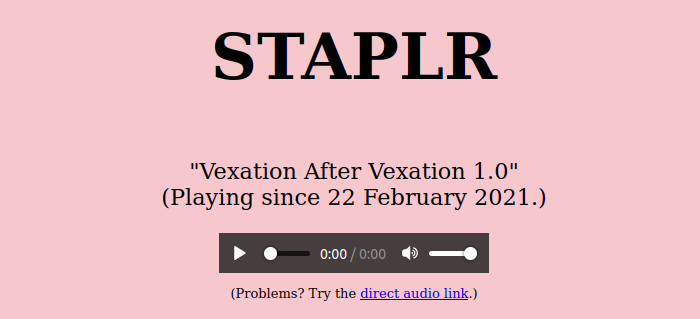STAPLR is running a new composition: “Vexation After Vexation,” an interpretation of Erik Satie’s mysterious solo piano work Vexations. You can listen to STAPLR on the site or right here:
I ran “Library Silences” for months and months—it seemed appropriate—but now it’s time for something different. (York University Libraries Ambiences are always available for home listening.)

The score of Vexations fits on one page, but instructions say (translated from French), “In order to play the theme 840 times in succession, it would be advisable to prepare oneself beforehand, and in the deepest silence, by serious immobilities.” The piece was ignored until John Cage took it, and the suggestion about 840 repetitions, seriously and organized a performance in 1963 where it was actually played 840 times. (This has been done many times since. In 2010 during Nuit Blanche I watched a performance downtown for quite a while. It was beautiful. If you want to hear it yourself by a real pianist, I recommend buying Stephane Ginsburgh’s 42 Vexations (1893) and making a playlist where the one track is played twenty times.)

In this STAPLR composition, one one-minute iteration of Vexations is played for each minute of help given at any desk at York University Libraries that day. It keeps a running counter of how many more minutes it should play. Let’s say that at 0900 someone checks their email and answers a quick research question that takes them five minutes. They enter that into our reference statistics system, where STAPLR sees it and counts 5. It starts to play five iterations. One minute later, the counter is at 4. One minute later, the counter goes down to 3, but there’s another question in the system, this time a virtual chat that took 10 minutes to answer, so the counter goes up to 13. After one iteration it goes down to 12, then 11, then up again if there’s another question. If the counter reaches 0 it will wait and start back up when there’s another question answered.

This is how it began this morning:
[2021-02-23 07:57:40] Vexation After Vexation 1.0: {} (0 mins)
[2021-02-23 07:58:40] Vexation After Vexation 1.0: {} (0 mins)
[2021-02-23 07:59:40] Vexation After Vexation 1.0: {"AskUs"=>{"1"=>[3]}} (3 mins)
[2021-02-23 08:00:40] Vexation After Vexation 1.0: {} (2 mins)
[2021-02-23 08:01:40] Vexation After Vexation 1.0: {"AskUs"=>{"1"=>[3]}} (4 mins)
[2021-02-23 08:02:40] Vexation After Vexation 1.0: {} (3 mins)
[2021-02-23 08:03:40] Vexation After Vexation 1.0: {} (2 mins)
[2021-02-23 08:04:40] Vexation After Vexation 1.0: {} (1 mins)
[2021-02-23 08:05:40] Vexation After Vexation 1.0: {"AskUs"=>{"1"=>[3]}} (3 mins)
[2021-02-23 08:06:40] Vexation After Vexation 1.0: {} (2 mins)
[2021-02-23 08:07:40] Vexation After Vexation 1.0: {} (1 mins)
[2021-02-23 08:08:40] Vexation After Vexation 1.0: {} (0 mins)
[2021-02-23 08:09:40] Vexation After Vexation 1.0: {} (0 mins)
Close to 1000 it really got going:
[2021-02-23 09:53:40] Vexation After Vexation 1.0: {"Osgoode"=>{"4"=>[40]}} (40 mins)
That ran down for 13 minutes then more activity came in and it’s been going ever since. I’m curious to see when it stops. (The server reboots around 0600, but it could run all night.)
Vexations has a bass theme played in the left hand and two sections (the second a slight variation of the first) played by the right hand accompanied by the bass theme on the left. It’s usually played thus: bass theme alone, theme A, bass theme alone, theme B, repeat. There are 13 quarter-notes in each section, so setting the speed to 52 bpm makes it work out at exactly one minute per repetition. This is faster than it’s normally played, but it still works well.
“Vexation After Vexation” doesn’t tell you how busy the desks at York University Libraries are right now, the way other STAPLR sonifications do, but I think it perfectly combines Satie and STAPLR. I’m looking forward to listening to it through to the end of April, at least.
Press play, turn the volume low, and let it go in the background through your day as a piece of aural furniture.
 Miskatonic University Press
Miskatonic University Press